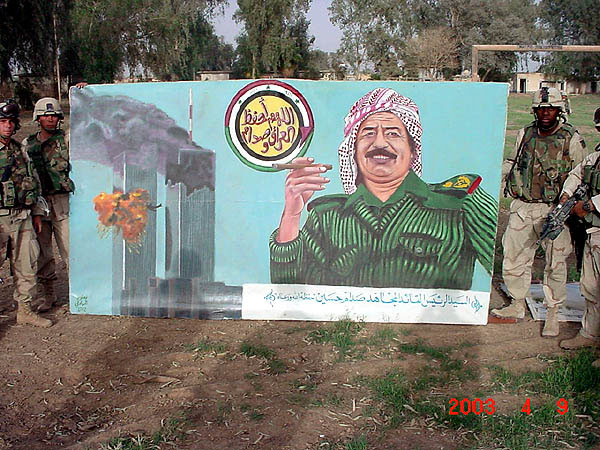State-Sponsored Disinformation
In the 16 months between Sept. 11, 2001, and the Iraq war—despite considerable efforts to entangle Saddam Hussein in the former[1]—hawks came up seriously short. Consequently, neither of the Bush administration’s two most publicized arguments for the war—the President’s State of the Union address and Secretary of State Colin Powell’s presentation to the U.N. Security Council—even mentioned the evidence allegedly implicating Baghdad in our day of infamy. Lest we misconstrue the subtext, on Jan. 31, 2003, Newsweek asked the President specifically about a 9/11 connection to Iraq, to which Bush replied, “I cannot make that claim.”
And yet, seven weeks later, a few days before the war began, the Gallup Organization queried 1,007 American adults on behalf of CNN and USA Today. The pollsters asked, “Do you think Saddam Hussein was personally involved in the Sept. 11th (2001) terrorist attacks (on the World Trade Center and the Pentagon), or not” Fifty-one percent of respondents said yes, 41% said no, and 8% were unsure. What accounts for this discrepancy between the American people and their government
Many blame the media; indeed, it has become a cliché, in the title of a recent book by Michael Massing, to say of antebellum reporting, Now They Tell Us (New York Review of Books, 2004). Such facileness, however, confuses coverage of Iraq’s purported “weapons of mass destructions”—which as some leading newspapers and magazines have since acknowledged was inadequately skeptical[2]—with coverage of Iraqi-al-Qaeda collaboration, which was admirably exhaustive.
Instead, two answers arise. First, the current White House is perhaps the most disciplined in modern history in staying on machine. Although the President denied the sole evidence tying Saddam to 9/11—an alleged meeting in Prague between an Iraqi spy and the ringleader of the airline hijackers in April 2001—the principals of his administration consistently beclouded and garbled the issue. As Secretary of Defense Donald Rumsfeld told Robert Novak in May 2002, “I just don’t know” whether there was a meeting or not. Or as George Tenet told the congressional Joint Inquiry on 9/11 a month later (though not unclassified until Oct. 17, 2002), the C.I.A. is “still working to confirm or deny this allegation.” Or as National Security Adviser Condoleezza Rice told Wolf Blitzer in September 2002, a month before Congress would vote to authorize the war, “We continue to look at [the] evidence.” Or as Vice President Richard Cheney told Tim Russert the same day, “I want to be very careful about how I say this. . . . I think a way to put it would be it’s unconfirmed at this point.” Indeed, a year later—even after U.S. forces in Iraq had arrested the Iraqi spy, who denied having met Mohammed Atta—Cheney continued to sow confusion: “[W]e’ve never been able to . . . confirm[] it or discredit[] it,” he asserted. “We just don’t know.”
A second hypothesis is that while Iraq had nothing to do with 9/11, it did have a relationship with al Qaeda. Never mind that at best the relationship was tenuous, that there was nothing beyond some scattered, inevitable feelers. That Saddam Hussein and Osama bin Laden had been in some sort of contact since the early 1990s allowed the Bush administration to shamelessly conflate their activities pertaining to 9/11 and those outside 9/11.
In this way, as late as October 2004, in his debate with John Edwards during the presidential campaign, Dick Cheney continued to insist that Saddam had an “established relationship” with al Qaeda. Senator Edwards’s reply was dead-on: “Mr. Vice President, you are still not being straight with the American people. There is no connection between the attacks of September 11 and Saddam Hussein. The 9/11 Commission said it. Your own Secretary of State said it. And you’ve gone around the country suggesting that there is some connection. There’s not.”
Two months ago, CBS News and the New York Times found that 30 percent of Americans still believe that Saddam Hussein was “personally involved in the September 11, 2001, terrorist attacks.” Sixty-one percent disagreed. This is certainly an improvement; yet the public is not entirely to blame. Nor is the Fourth Estate.
Rather, the problem lies primarily with the Bush administration. Andrew Card, George W. Bush’s Chief of Staff, explained it best. “I don’t believe you,” he told Ken Auletta of the New Yorker, “have a check-and-balance function.” In an interview, Auletta elaborated: “[T]hey see the press as just another special interest.” This is the real story of the run-up to the Iraq war: not a press that is cowed or bootlicking, but a government that treats the press with special scorn and sometimes simply circumvents it. As columnist Steve Chapman put it, the administration’s policy was “never to say anything bogus outright when you can effectively communicate it through innuendo, implication and the careful sowing of confusion.”
Indeed, now that we are learning more stories of propaganda from this administration—$100 million to a P.R. firm to produce faux video news releases; White House press credentials to a right-wing male prostitute posing as a reporter; payolas for two columnists and a radio commentator to promote its policies—the big question isn’t about the supposed failings of the press. The question is about the ominously expanding influence of state-sponsored disinformation.
Footnotes
[1] For instance, on 10 separate occasions Donald Rumsfeld asked the C.I.A. to investigate Iraqi links to 9/11. Daniel Eisenberg, “‘We’re Taking Him Out,’” Time, May 13, 2002, p. 38.
Similarly, Dick Cheney’s chief of staff, I. Lewis “Scooter” Libby, urged Powell’s speechwriters to include the Prague connection in his U.N. address. Dana Priest and Glenn Kessler, “Iraq, 9/11 Still Linked by Cheney,” Washington Post, September 29, 2003.
[2] See, for instance, The Editors, “Iraq: Were We Wrong,” New Republic, June 28, 2004; [Author unspecified], “The Times and Iraq,” New York Times, May 26, 2004; and Howard Kurtz, “The Post on W.M.D.: An Inside Story,” Washington Post, August 12, 2004.

 Comments
Comments